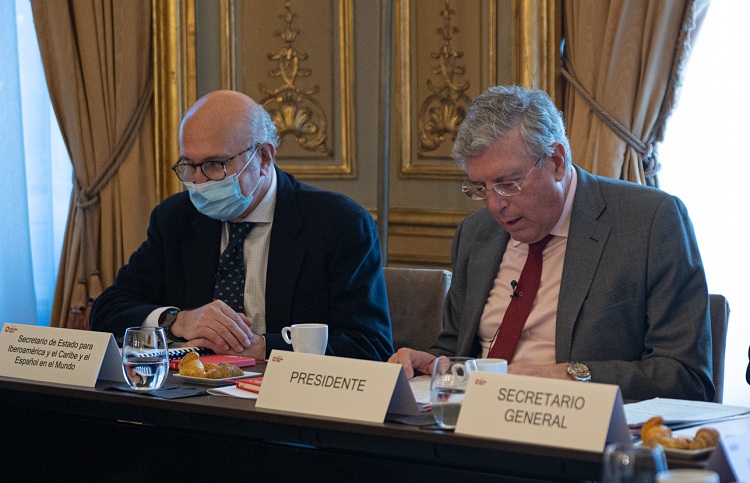Eduardo González
The Ministry of Foreign Affairs yesterday made a certainly flattering balance of its own management in the “intense exercise” of 2021, which was “marked” by “the evacuation of collaborators from Spain and their families in Afghanistan” and by the contribution of Spain to alleviate “the persevering effects of the pandemic” with “the donation of doses of solidarity vaccines to those countries that need it most.”
“On October 11 and 12, two planes landed in Spain with 244 Afghan collaborators from our country” and, since then, the Ministry of Foreign Affairs “has been transferring to Spain more than 200 Afghan collaborators and their families”, a “gradual process that has been carried out once the major evacuation operations have been concluded and with the objective of not leaving any of our collaborators in that country behind”, assured the Department headed by José Manuel Albares in a long press release.
Besides, the Ministry continued, “since April, when the President of the Government (Pedro Sánchez) committed himself to a first donation of 7.5 million doses of vaccines as soon as our country reached the first goal of 50% of the vaccinated population, we have more than fulfilled that objective”. “Spain is one of the countries with the highest vaccination rates and one of the world’s leading donors,” since, “having delivered more than 40 million vaccines in 2021, Spain will continue to donate vaccines until reaching 50 million doses in the first quarter of 2022,” it assured. “At present, our country is sixth in the world in number of vaccines donated, fifth in effective donations via COVAX (third in the EU), second country in the world by vaccines donated/GDP and second donor country in Latin America,” the Ministry stated.
“Two and a half laps around the world”
The summary of the “intense fiscal year” of 2021, in which no mention is made of Albares’ predecessor, Arancha González Laya (who was dismissed in July, in the second half of the year), nor of the diplomatic crisis with Morocco (which broke out during the mandate of the former minister), recalls that “the General State Budgets of 2022 will mean the recovery of a lost decade for Spanish Cooperation to reach unprecedented levels since 2011 due to successive cuts” and highlights the “intense international agenda developed by Minister José Manuel Albares and his team”, with special attention to the celebration, in November, of the VI Forum of the Union for the Mediterranean (UfM) and the EU-Southern Neighborhood meeting in Barcelona and his numerous international trips.
“Since taking office, Minister Albares has traveled more than 100,000 kilometers, equivalent to two and a half laps around the world,” and has participated in 14 multilateral meetings on behalf of Spain and in a total of 76 bilateral meetings with “his counterparts, European commissioners and secretaries general of international organizations,” the press release continued.
USA and Latin America
Apart from this, Foreign Affairs attaches “special importance” to relations with the United States, “in which Spain has maintained a fluid dialogue with the administration (of Joe) Biden at all levels, with several calls and a face-to-face meeting between Minister Albares and his counterpart Secretary of State, Anthony Blinken, in which the latter expressed his appreciation for the continued support that Spain has provided to the United States at the bases of Rota and Morón in the framework of the operations to evacuate Afghan citizens”. “In addition to multilateral issues, the situation in Afghanistan and in Latin America, Spain and the United States have agreed to work together for the NATO Summit that Spain will host in June 2022,” it continued.
“Ibero-America and the Caribbean have once again occupied a central place in Spanish foreign policy in this 2021,” as demonstrated by “the recovery of the Secretariat of State for Ibero-America and the Caribbean and for Spanish in the World,” the Ministry assured. Thanks to this, “special attention is being paid to deepening the strategic bi-regional relationship between the European Union and Latin America and the Caribbean” and it is planned “to strengthen the Ibero-American agenda during our Spanish Presidency of the EU in 2023.” “We have already incorporated Ibero-American issues (Nicaragua and Venezuela) into the agenda of the Foreign Affairs Councils to be jointly addressed at the European level,” added Albares’ Department.
“The road towards that Spanish Presidency of the EU in the second half of 2023 has also been paved with various meetings with European citizens within the framework of the Conference on the Future of Europe,” the Ministry affirmed.
Apart from that, the press release gives an account of the reorganization of the Ministry’s organizational structure, with the creation of a new Secretary of State for Ibero-America and Spanish in the world and of the Secretary General for the European Union to strengthen the Secretary of State for the European Union in view of the Spanish Presidency in 2023. “In this restructuring, the policy of appointments of the Ministry’s management team attends to the principle of gender equality, with the appointments of a parity team that responds to the social reality of our country,” Foreign Affairs assured.
“In addition, all units have been grouped together in the new headquarters in Madrid’s Plaza del Marqués de Salamanca, with a total area of 55,000 square meters and a maximum capacity of 1,355 people,” the note continued. “The move has led to significant savings in leases and, after more than 16 years, fulfills the commitment to return to the historic headquarters of the Ministry of Foreign Affairs, European Union and Cooperation,” it concludes.







